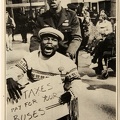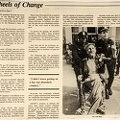[Headline] Wheels of Change in Detroit:
[Subheading] Disabled Hit Motor City
A terrible threat was facing Detroit. The city's police force was prepared; its officers had undergone special intensive training. Over four days, hundreds of cops were on the streets to deal with the menace. The Detroit police department cancelled a march previously approved because of "danger of physical violence". The cops considered this menace more threatening than the Nazi party, which had been allowed to parade in Detroit a month before.
What posed such an extraordinary threat to the people of Detroit? A group of people confined to wheelchairs, ADAPT, Americans Disabled for Accessible Transportation. Detroit was feeling the power of people coming together to fight for the right to get on the bus.
It started in Denver, where after six years of determined and vocal protest, disabled people won a completely wheelchair accessible transit system. Then ADAPT went national to tackle the issue on a larger scale. The issue of getting on the bus is not a minor one. There are an estimated 36 million disabled persons in the United States. For all of these people, transportation is a basic need for independence. In most cities a person in a wheelchair can-not get on any regularly scheduled transportation system. Being unable to get to and from work prevents many disabled people from keeping a job and so winning a measure of independence.
The fight for independence is a practical one. It is also a symbolic one.
"The disabled are one of the most oppressed groups," says Wade Blank of ADAPT. "Their average pay is under 10 cents an hour because of a waiver of minimum wage laws. Those who can get a job often work in sweat-shop conditions."
According to Blank, "The black struggle for civil rights in the sixties taught us everything we need to know. Separate is not equal. If a group is not allowed to integrate, it will be treated worse than the rest of society."
He further explains that Martin Luther King Jr. chose buses as an issue that symbolized racism. ADAPT chose buses as a symbol of paternalism.
Transportation for the disabled is a nationwide issue but ADAPT can't be everywhere at once, so in true guerilla fashion, it follows the symbol of its oppression. This symbol is the American Public Transit Association, APTA. APTA is a professional lobbying group representing the interests of transportation officials from all over the country. APTA has come out against full transportation accessibility for the disabled. The stated reason is the cost of installing wheelchair lifts in each bus. According to Donald Lozen of the Center for Independent Living in Detroit, however, this cost is no greater than the expense of installing air-conditioning in city buses.
In addition to forcing APTA to change its discriminatory stance, ADAPT fights to win changes in local transit systems. Many local battles have been won. In addition to Denver, ADAPT has won changes in Seattle, Kansas City, Colorado Springs, Dallas, and Atlanta.
Before coming to Detroit, ADAPT hit Cincinnati, where, in four days of street fighting, the wheelchair pro-testers tied up bus service for an after-noon which threatened to bring the en-tire city to a halt. Seventeen ADAPT demonstrators were arrested and several were jailed for six days. (See Disclosure No. 93 for details.)
Disabled Americans from all over the country converged on Detroit on October 6-9 to protest continued discrimination against people in wheelchairs. APTA was holding its annual national convention there.
ADAPT's protest began on Sunday, October 5, with a wheelchair march along Michigan Avenue to the Westin Hotel where APTA members were staying. ADAPT members marched along the sidewalks, shouting"We Will Ride." They were forced to stay on the sidewalk since their parade permit had been revoked at the last minute by the city of Detroit.
APTA members were so terrified by the prospect of being confronted by the angry disabled protesters that when they left the hotel for a fancy cocktail party at the Ford Museum, they snuck out the back way.
[Image]
[Image caption]
Four police tackle one disabled ADAPT protester in Detroit.
ADAPT members blocked the front entrance to the Museum with their wheelchairs, forcing 2,300 APTA members to walk a long way in the rain to get in by the Museum's back entrance.
Even though the protesters could not get at the partygoers directly, they stuck it out. "One of our people got a door open," recalls Blank. "We were throwing things and shouting to remind them that the peasants were outside in the rain. I can't imagine how they felt, see-ing all those wheelchairs in the rain. They had to feel bad."
The transit officials and the police were expecting ADAPT members to try and make a hit at the APTA convention the next day when Mayor Young was speaking. ADAPT took them by surprise and went to the Mayor's office instead.
ADAPT got 50 wheelchairs up the elevators before the cops even caught on. When they stopped protesters from going up the elevators, they took the escalators, which the police had thought was impossible.
When, one way or another, about 85 protesters were upstairs, ADAPT members asked the Mayor's staff, "Do we have the right to go on Detroit buses?" Fred Martin, the Mayor's Assistant, said, "Sure, anyone can ride on the Detroit buses."
ADAPT members took Martin at his word and tried to board and pay fare on downtown buses. They picked 18 stops and all started crawling on at the same time.
"We shut down the buses downtown. Then the arrests started. They classified our action as disorderly conduct," notes Blank. "I didn't know getting on a bus was disorderly conduct."
There were 18 arrests of the would-be passengers. The police, having been specially trained, handled the pro-testers with care, 3-4 officers to a chair, but the jail was not wheelchair accessible, so they were stuck in the police gym.
To protest the jailings, 60 ADAPT members who hadn't been arrested circled the police station chanting, "Let Our People Go" for three hours. Twenty police officers stood and watched in awe.
And they did let the protesters go. People were released overnight since the police had no facilities to keep the disabled in.
The following day, the protesters came together outside the McNamara Federal building. Their purpose was to meet with Senator Donald Riegle's staff. But as the people in wheelchairs began to go up the escalators in pairs, the police started making arrests, 37 in all. So it was back to jail.
[Pulled quote] "'l didn't know getting on a bus was disorderly conduct."
[text continues] Everyone was eventually released after a judge examined and denounced the conditions the disabled were being kept under as deplorable.
ADAPT's protests in Detroit did more than make transit officials squirm. It also gave new hope to disabled people in the Detroit area. An ADAPT chapter has just formed in Detroit. SEMTA, Southeastern Michigan Transportation Authority, one of two bus systems serving Detroit, has just signed a resolution committing itself to completely accessible transport by 1988. This resolution affirms that "the ability to ride a public transit vehicle is a civil right that should not be denied to any individual."
Donald Lozen says that for the first time, handicapped people in Detroit are starting to come together to work on common issues. "We must thank ADAPT; it's a direct result of their coming to town."
[Image]
[Image caption] "We Will Ride."
- Created on
- Thursday 11 July 2013
- Posted on
- Monday 31 July 2017
- Albums
- Visits
- 658
- Rating score
- no rate
- Rate this photo


0 comments